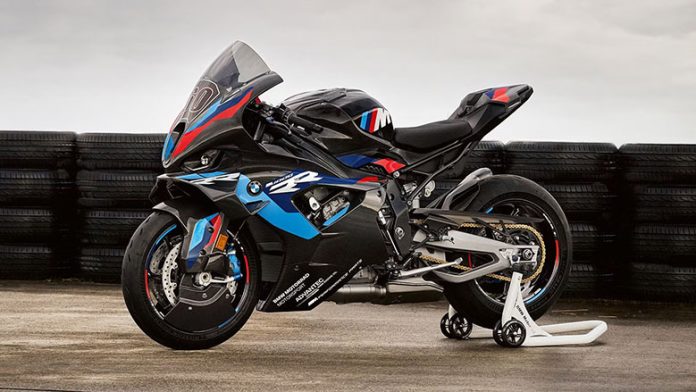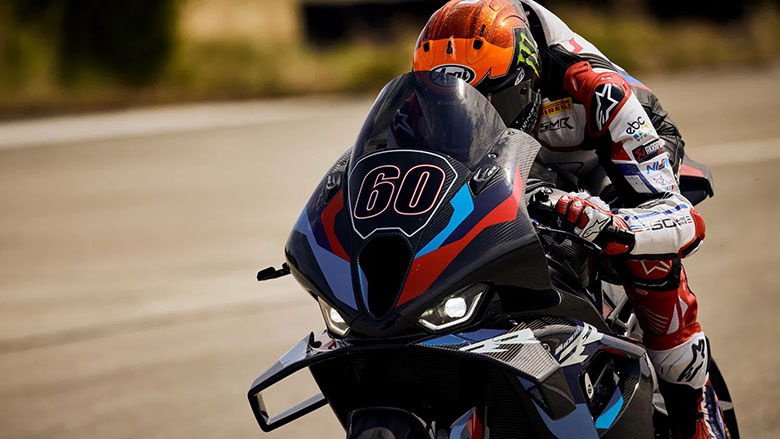For more than a century, Bayerische Motoren Werke has maintained a dominant presence in the racing world, and the newly updated 2024 BMW M 1000 RR Sports Motorcycle stands as clear proof of that legacy. This motorcycle is a pure racing machine, even though it features turn signals and a license plate, allowing it to be legally ridden on public roads. The extensive use of titanium and carbon fibre lends it a futuristic feel while ensuring a high strength-to-weight ratio. The 2024 model features revised bodywork and aerodynamic foils designed to enhance downforce, reduce drag, and improve overall performance. Its aggressive styling is the natural result of functionality and engineering precision, as every design choice serves a performance-driven purpose.
Between the numerous stock components and the variety of available accessories, riders have multiple options to personalise their bike, especially with the exclusive “M” racing package. The 2024 BMW M 1000 RR Sports Motorcycle retains several elements from the previous generation, including a sophisticated electronics suite that combines both racing and street systems as part of the standard setup. As a homologated motorcycle, it complies with official racing regulations.
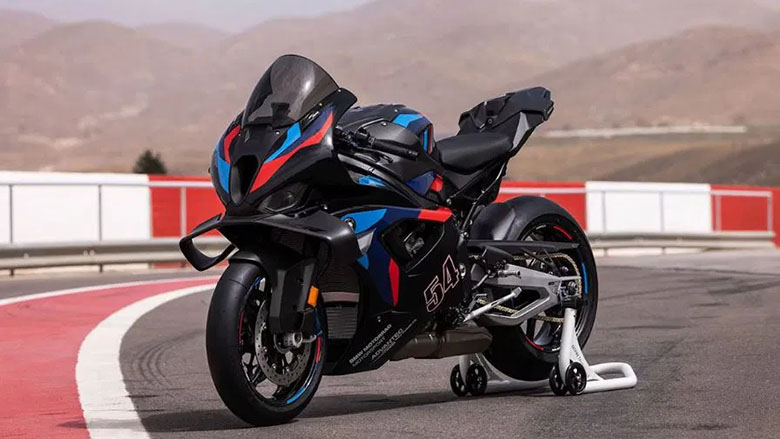
The litre-class inline-four engine once again serves as the heart of this powerful machine, producing over 200 horsepower for an exhilarating riding or racing experience. It demands great restraint on public roads, even more so than regular sportbikes, making it less suitable for casual city use. In truth, this motorcycle truly belongs on the racetrack, piloted by a skilled rider capable of unleashing its full potential.
2024 BMW M 1000 RR Sports Motorcycle – Features and Specs
Performance and Capability
The 2024 BMW M 1000 RR Sports Motorcycle draws power from a transversely mounted inline-four engine packed with advanced technology hidden beneath its aerodynamic fairing. It is water-cooled to effectively manage heat while incorporating an oil cooler to minimise thermal stress and preserve engine integrity.
Also Read: 2024 BMW S 1000 RR Sports Motorcycle Review
Dual overhead camshafts features four valves per cylinder. BMW’s ShiftCam technology on the intake camshaft enhances torque delivery at lower speeds, while the variable-length intake funnels further boost low-end power. This design ensures immediate torque response as the engine revs. The titanium valves, renowned for their durability and lightweight nature, reduce the moving mass within the valvetrain and withstand the extreme heat generated by the engine.
The engine’s dimensions are highly oversquare, with an 80 mm bore and 49.7 mm stroke, yielding a total displacement of 999 cc. A high compression ratio of 13.5:1 requires premium, high-octane fuel to prevent detonation or misfires, although most riders would naturally opt for premium-grade fuel for such a machine.
The 2024 BMW M 1000 RR Sports Motorcycle delivers 205 horsepower and 83 pound-feet of torque. Power is transferred through a six-speed gearbox and a chain final drive. At the same time, a slipper clutch mitigates rear-wheel slippage during aggressive downshifts by absorbing back torque—the overall gearing results in a top speed exceeding 189 miles per hour.
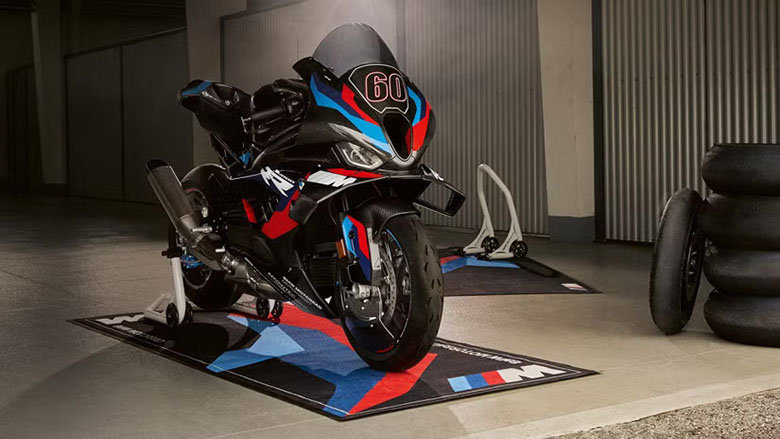
In terms of electronics, Hill Start Control Pro comes standard along with Dynamic Traction Control, ensuring smooth starts and optimal grip. The advanced Pro Riding Modes system features include Launch Control, Wheelie Control, and Shift Assist Pro, all designed for racing-oriented performance. For street riding, selectable modes including Road, Rain, and Dynamic allow the rider to adjust throttle response to current conditions. Launch Control optimises starts from a standstill, while Shift Assist enables clutchless gear changes, and the Pit Limiter helps regulate maximum speed for race pit compliance. Riders seeking a more authentic race feel can even configure MotoGP-style shifting.
Design
Every aspect of the 2024 BMW M 1000 RR Sports Motorcycle’s design adheres to the principle of form following function. Each visible component has undergone detailed in-house computer modelling and wind tunnel testing by BMW to achieve maximum aerodynamic efficiency. The carbon-fibre construction provides lightweight rigidity, while the taller windscreen introduced this year improves airflow around the rider. Updated for 2023, the “M” winglets generate 12.6 pounds of downforce at 95 miles per hour and an impressive 49.8 pounds at 186 miles per hour. Although these effects are minimal at legal road speeds, they significantly enhance stability during high-speed racing, making for an impressive design feature.
The front fender features foil-shaped supports that serve as spoilers for the front fork tubes, and integrated vents help reduce brake temperatures by up to 50 degrees Fahrenheit under track conditions. Dual LED headlights are positioned within the front fairing above the bi-plane winglets, with LED indicators at both ends for improved visibility. The indicator wiring has been redesigned for easier access, allowing quicker modifications on race days.
An LED taillight completes the rear lighting setup. The redesigned tail section and M Endurance seat are engineered for both comfort and control during long rides. Riders who venture out in colder seasons will appreciate the heated grips, which are included as standard. Although the stock model already includes significant carbon-fibre components, the racing package adds even more, enhancing both aesthetics and performance.
Chassis
The 2024 BMW M 1000 RR Sports Motorcycle’s frame is built from lightweight aluminium in a bridge-type design that uses the engine as a stressed member, minimising overall frame material and reducing weight. The suspension system is constructed from premium components, featuring 45 mm front forks and a central rear monoshock that controls the aluminium swingarm. Both ends provide full manual adjustability for preload, rebound, and compression damping. Riders can also opt for the automatic electronic suspension system, which continuously adjusts settings for optimal performance without manual tuning. Suspension travel measures 4.7 inches at the front and 4.6 inches at the rear.
Standard M Carbon wheels further reduce weight and enhance agility, running on 17-inch rims paired with 120/70 in front and 200/55 in rear tyres. These Z-rated tyres are engineered to perform reliably even at racetrack speeds. For aggressive cornering enthusiasts, the 2024 BMW M 1000 RR Sports Motorcycle delivers exceptional handling precision, though controlling its full potential on public roads requires discipline.
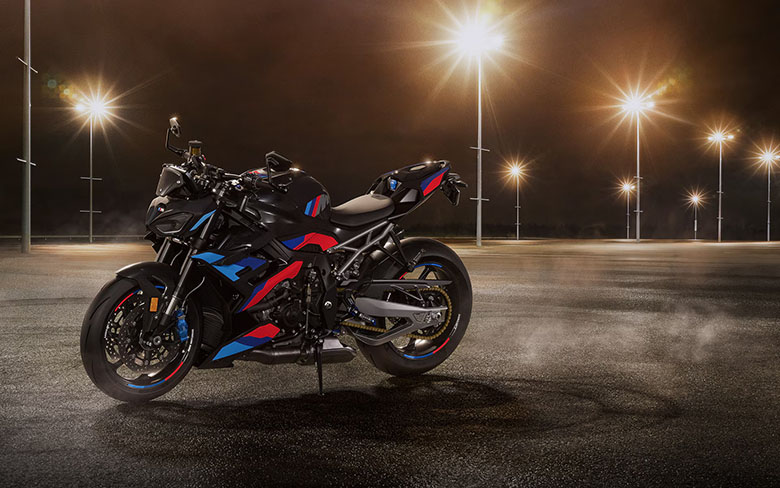
The braking system features dual 320 mm front discs with four-piston callipers and a 220 mm rear disc with a twin-piston calliper. Racing ABS and ABS Pro systems provide additional electronic safety and stability during hard braking. The steering geometry includes a rake angle of 23.8 degrees and 3.99 inches of trail, resulting in sharp, responsive handling. The reduced gyroscopic effect of the lightweight wheels further enhances agility, allowing effortless direction changes.
Also Read: 2024 BMW G 310 GS Adventure Motorcycle Review
Price and Availability
The manufacturer’s suggested retail price for the 2024 BMW M 1000 RR Sports Motorcycle starts at $33,345. Buyers can choose between Light White or Blackstorm Metallic finishes, both accented with the signature “M” Motorsport livery, at the same price. Those who select the M Competition Package can expect to pay an additional $5,395 for its upgraded components and enhancements.
2024 BMW M 1000 RR Sports Motorcycle Vs. Honda CBR1000RR-R Fireblade SP
The Honda CBR1000RR-R Fireblade SP is powered by a 999 cc engine that produces 215 horsepower and 83 pound-feet of torque, offering a slight edge in output compared to the BMW’s 205 horsepower and 83 pound-feet. However, the difference in power is minimal and unlikely to outweigh rider skill in real-world conditions. In terms of electronics, Honda’s system is somewhat simpler, while BMW’s advanced racing electronics give it an advantage in both technology and customisation.
Honda incorporates titanium components into its engine design to enhance strength and reduce weight. It also includes Öhlins suspension with electronic adjustment as part of the standard setup, providing an advantage in suspension performance. The current Fireblade model is the 2022 version, priced at $28,900. Prospective buyers must decide whether the lower cost compensates for the relatively modest electronic features compared to BMW’s extensive system.
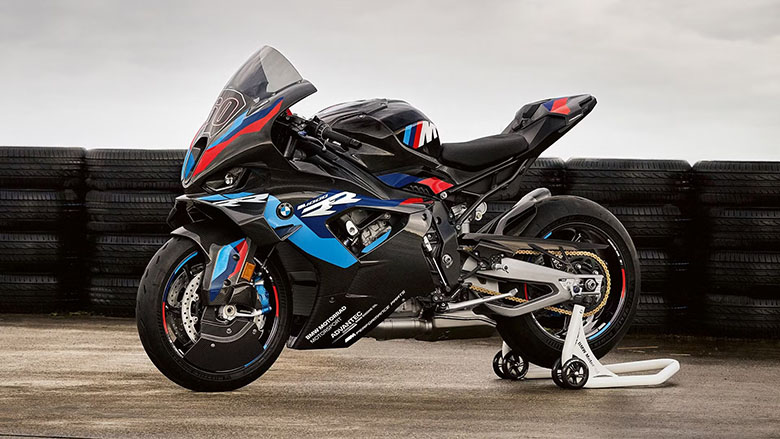
2024 BMW M 1000 RR Sports Motorcycle Vs. 2024 Kawasaki Ninja H2 Carbon
The Kawasaki Ninja H2 Carbon from the legendary Ninja lineup is another fierce competitor, delivering extreme performance. Although it is not homologated for official racing, it includes a wide range of advanced electronics similar to those found on the BMW, and considerably more than what the Honda offers.
Its 998 cc engine may sound comparable on paper, but the inclusion of a supercharger dramatically increases volumetric efficiency, generating 310 horsepower and 121.5 pound-feet of torque. This makes the H2 Carbon one of the most powerful production motorcycles available, capable of outperforming nearly anything on the road. While its suspension setup lacks the electronic refinement of Honda’s Öhlins system, it matches BMW’s adjustability in manual tuning. Kawasaki prices the Ninja H2 Carbon at $35,000, giving BMW a slight advantage in terms of cost-to-performance value.
2024 BMW M 1000 RR Sports Motorcycle – Technical Specifications
Engine
| Type | Liquid-cooled inline 4-cylinder |
| Capacity | 999cc |
| Bore x stroke | 80.0mm x 49.7mm |
| Power | 205hp @ 13,000 rpm |
| Torque | 83lb-ft @ 11,000 rpm |
| Max. engine speed | 15,100 rpm |
| Compression ratio | 13.5:1 |
| Fuel | Power rated at 98 RON. 95-98 RON knock control |
| Valvetrain | DOHC, valve actuation via single cam followers
BMW ShiftCam variable intake cam control |
| Valves per cylinder | 4 |
| Intake / Exhaust valve diameter | 33.5mm / 27.2mm |
| Throttle body diameter | 48mm |
| Engine control | BMS-0 |
| Emission control | Closed-loop three-way catalytic converter |
| Alternator | 450 watts |
| Battery | M lightweight battery 12v / 5 Ah |
| Headlamp | LED free-form twin low-beam, LED free-form high-beam |
| Starter | 0.8kW |
| Clutch | Self-reinforcing multi-plate anti-hopping oil bath clutch, mechanically operated |
Transmission
| Gearbox | 6-speed, constant-mesh |
| Primary ratio | 1.652 |
| Transmission gear ratios I | 2.647 |
| II | 2.091 |
| III | 1.727 |
| IV | 1.500 |
| V | 1.360 |
| VI | 1.261 |
| Secondary ratio | 2.706 |
| Rear wheel drive type | Chain |
Chassis
| Frame construction type | Aluminium composite bridge frame, engine self-supporting |
| Front suspension | Upside-down telescopic fork, 45 mm slide tube diameter Spring preload, rebound and compression adjustable Optional DDC electronically adjustable damping |
| Rear suspension | aluminium underslung double-sided swingarm Central spring and shock absorber Spring preload, rebound and compression adjustable Optional DDC electronically adjustable damping |
| Suspension travel front / rear | 4.7 inches / 4.6 inches |
| Wheel caster | 3.9 inches |
| Steering head angle | 23.6 degrees |
| Brakes, front | Twin M 320 mm / 12.6-inch floating disks 4-piston fixed callipers |
| Brakes, rear | Single 220 mm / 8.7-inch, two-piston fixed calliper |
| ABS | BMW Motorrad ABS Pro, partially integral, disengageable |
| Traction control | BMW Motorrad DTC |
| Wheels | Standard M Carbon wheels |
| Wheels, front / rear | 3.50 inches x 17 / 6.00 inches x 17 |
| Tires, front / rear | 120/70 ZR17 / 200/55 ZR17 |
Dimensions
| Length x width x height | 81.6 inches x 33.4 inches x 47.4 inches |
| Wheelbase | 57.4 inches |
| Seat height | 32.8 inches |
| Curb weight | 423 lbs. |
| Dry weight | 375 lbs. |
| Permitted total weight | 897 lbs. |
| Fuel tank capacity | 4.35 gallons |
Others
| Acceleration, 0-60 mph | 3.1 seconds |
| Top speed | 189+ mph |

